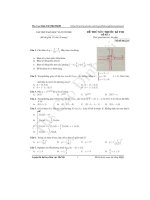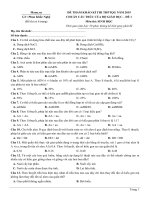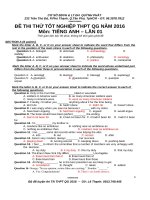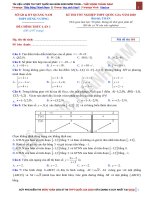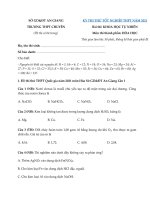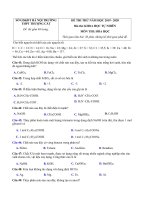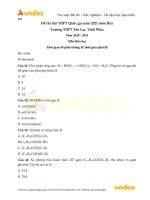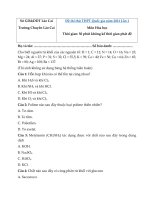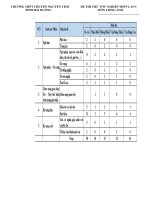Tải Đề thi thử tốt nghiệp THPT lần 3 môn Anh trường THPT Chuyên Bắc Giang năm 2020 - Đề thi tiếng Anh THPT Quốc Gia 2020 có đáp án
Bạn đang xem bản rút gọn của tài liệu. Xem và tải ngay bản đầy đủ của tài liệu tại đây (137.83 KB, 8 trang )
<span class='text_page_counter'>(1)</span><div class='page_container' data-page=1>
<b>ĐỀ THI THỬ THPTQG MÔN TIẾNG ANH</b>
<b>NĂM 2020 CÓ ĐÁP ÁN</b>
<i><b>Mark the letter A, B, C or D on your answer sheet to indicate the sentence that is closest in</b></i>
<i><b>meaning to each of the following questions.</b></i>
<i><b>Question 1: Arguing with the boss has considerably reduced his chances of promotion.</b></i>
<b>A. His promotion was certain until he had a dispute with the boss.</b>
<b>B. The likelihood of his being promoted has significantly decreased because of his argument</b>
with the boss.
<b>C. He argued with the boss about why he wasn't considered for promotion.</b>
<b>D. He would definitely have been promoted by now if had hadn't quarreled with the boss.</b>
<i><b>Question 2: My friend told me, "If I were you, I would not smoke so much."</b></i>
<b>A. My friend prohibited me from smoking so much.</b>
<b>B. My friend warned me against smoking so much.</b>
<b>C. My friend advised me not to smoke so much.</b>
<b>D. My friend suggested not smoking so much.</b>
<b>Question 3: When I picked up my book, I found that the cover had been torn.</b>
<b>A. Picking up my book, the cover had been torn.</b>
<b>B. The cover had been torn when my book picked up.</b>
<b>C. On picking up the book, I saw that the cover had been torn.</b>
<b>D. Picked up, the book was torn.</b>
<i><b>Mark the letter A, B, C or D on your sheet to indicate the most suitable respone to complete</b></i>
<i><b>each of the following exchanges.</b></i>
<i><b>Question 4: Kathy and Kim are friends. They have just finished lunch in a restaurant.</b></i>
- Kathy: “The food is great. I'll get the bill.”
- Jim: “__________________”
<b>A. Yes, speak to you soon.</b> <b>B. Don't mention it.</b>
<b>C. It’s nothing</b> <b>D. No, this is on me.</b>
<i><b>Question 5: Billy and Bobby are in a coffee shop. Billy is asking Bobby for his opinion about</b></i>
<i>the coffee there.</i>
</div>
<span class='text_page_counter'>(2)</span><div class='page_container' data-page=2>
- Bobby:“________________”
<b>A. It's a little better now that I've got a car</b> <b>B. As a matter of fact, I'm not interested.</b>
<b>C. It's a little bitter, to tell the truth</b> <b>D. No, I don't think so.</b>
<i><b>Mark the letter A, B, C or D to indicate the word(s) CLOSEST in meaning to the underlined</b></i>
<i><b>word(s) in each of the following questions.</b></i>
<b>Question 6: Since her parents' death, she has been brought up by her uncle.</b>
<b>A. cried for</b> <b>B. died for</b> <b>C. lived with</b> <b>D. been in touch</b>
<b>Question 7: I'll not stand for your bad attitude any longer.</b>
<b>A. care</b> <b>B. like</b> <b>C. mean</b> <b>D. tolerate</b>
<i><b>Mark the letter A, B, C or D to indicate the word(s) OPPOSITE in meaning to the underlined</b></i>
<i><b>word(s) in each of the following questions.</b></i>
<b>Question 8: Most of the guests at the dinner party chose to dress elegantly, but one man wore</b>
jeans and a T shirt; he was later identified as a high school teacher.
<b>A. gracefully</b> <b>B. decently</b> <b>C. gaudily</b> <b>D. unsophisticatedly</b>
<b>Question 9: I'm sorry I can't come out this weekend - I'm up to my ears in work.</b>
<b>A. bored </b> <b>B. scared</b> <b>C. busy</b> <b>D. free</b>
<i><b>Mark the letter A, B, C or D on your answer sheet to indicate the sentence that is best</b></i>
<i><b>combines each pair of sentences in the following questions.</b></i>
<i><b>Question 10: Seth informed us of his retirement from the company. He did it when arriving at</b></i>
<i>the meeting.</i>
<b>A. No sooner had Seth arrived at the meeting than we were told about his leaving the company.</b>
<b>B. Not until Seth said to us that he would leave the company did he turn up at the meeting.</b>
<b>C. Hardly had Seth notified us of his retiring from the company when he arrived at the meeting.</b>
<b>D. Only after his retiring from the company did Seth tell us about his arrival at the meeting.</b>
<i><b>Question 11: My mother is very busy with her work at the office. She still takes good care of</b></i>
<i>us.</i>
<b>A. Although my mother was very busy with her work at the office, she still takes good care of</b>
us.
<b>B. My mother is so busy with her work at the office that she cannot take good care of us.</b>
<b>C. My mother is too busy with her work at the office to take good care of us.</b>
</div>
<span class='text_page_counter'>(3)</span><div class='page_container' data-page=3>
<i><b>the correct word or phrase that best fits each of the numbered blanks.</b></i>
The fictitious androids written about in the mid-1900s are becoming a reality with advances in
the field of robotics, Japan and Korea have been pioneers in this field. They regularly compete
<b>to be the first. The focus on most researchers is in (12) ______ life-like, attractive female</b>
androids. A Japanese research group led by Hiroshi Ishiguro created the world's first female
android, which is called Actroid in 2003. The early model was limited so upgrades were made
and the dramatic entertainment model was released in 2006. Actroids are covered with a
<b>silicone skin and have built-in sensors making them (13)______ of reacting to humans, and they</b>
<b>can also mimic many human behaviors. (14) ______ they can be programmed to speak in any</b>
language. The Korean android, EveR-2, released in 2006, was designed by a team from Kitech.
They claim that she is more life-like than Actroids, and she can mimic emotions. She can also
<b>speak and move her lips to match her (15) ______ Future models are expected to have higher</b>
mobility and even be proficient in dancing. Research teams have also created male androids.
One in particular is the Germinoid HI-I. Regardless of the competition, it's clear that this
<b>technology will one day present us (16) ______ the dilemma of determining human from</b>
machine.
<b>Question 12: A. creating</b> <b>B. forming</b> <b>C. improving</b> <b>D. shaping</b>
<b>Question 13: A. able</b> <b>B. possible</b> <b>C. probable</b> <b>D. capable</b>
<b>Question 14: A. Additional</b> <b>B. However</b> <b>C. Therefore </b> <b>D. Otherwise</b>
<b>Question 15: A. spoken</b> <b>B. speaking</b> <b>C. speak</b> <b>D. speech</b>
<b>Question 16: A. for </b> <b>B. with</b> <b>C. towards</b> <b>D. into</b>
<i><b>Read the following passage and mark the letter A, B, C or D on your answer sheet to indicate</b></i>
<i><b>the correct answer to each of the questions</b></i>
Different cultures follow their own special customs when a child's baby teeth fall out. In
Korea, for example, they have the custom of throwing lost teeth up on the roof of a house.
According to tradition, a magpie will come and take the tooth. Later, the magpie will return
with a new tooth for the child. In other Asian countries, such as Japan and Vietnam, children
<b>follow a similar tradition of throwing their lost teeth onto the roofs of houses. </b>
</div>
<span class='text_page_counter'>(4)</span><div class='page_container' data-page=4>
Tradition says that the new tooth will grow good and strong if the baby tooth is fed to a
guardian angel. Accordingly, parents in Mongolia will put their child's lost tooth in a piece of
meat and feed it to a dog.
The idea of giving lost teeth to an angel or fairy is also a tradition in the West. Many
children in Western countries count on the Tooth Fairy to leave money or presents in exchange
<b>for a tooth. The exact origins of the Tooth Fairy are a mystery, although the story probably</b>
began in England or Ireland centuries ago. According to tradition, a child puts a lost tooth under
his or her pillow before going to bed. In the wee hours, while the child is sleeping, the Tooth
Fairy takes the tooth and leaves something else under the pillow. In France, the Tooth Fairy
leaves a small gift. In the United States, however, the Tooth Fairy usually leaves money. These
days, the rate is 1 USD to 5 USD per tooth, adding up to a lot of money from the Tooth Fairy!
<i>(Source: Reading Challenge 2 by Casey Malarcher & Andrea Janzen)</i>
<b>Question 17: According to the passage, which of the following is NOT true about the tradition</b>
of tooth giving in the West?
<b>A. Children put their lost teeth under their pillows.</b>
<b>B. Children hope to get money or gifts from the Tooth Fairy.</b>
<b>C. Children give money to the Tooth Fairy</b>
<b>D. Lost teeth are traditionally given to an angel or fairy.</b>
<b>Question 18: What is the passage mainly about?</b>
<b>A. Presents for young children's lost teeth</b> <b>B. Animals eating children's lost teeth</b>
<b>C. Customs concerning children's lost teeth</b> <b>D. Traditions concerning children's lost teeth</b>
<b>Question 19: The word “their” in paragraph 1 refers to ______</b>
<b>A. houses'</b> <b>B. roofs'</b> <b>C. children's</b> <b>D. countries'</b>
<b>Question 20: According to paragraph 2, parents in Mongolia feed their child's lost tooth to a</b>
dog because _____.
<b>A. they hope that their child will get some gifts for his or her tooth</b>
<b>B. they think dogs like eating children's teeth</b>
<b>C. they believe that this will make their child's new tooth good and strong</b>
<b>D. they know that dogs are very responsible animals</b>
<b>Question 21: The word "origins" in paragraph 3 is closest in meaning to</b>
<b>A. countries</b> <b>B. families</b> <b>C. stories</b> <b>D. beginnings</b>
</div>
<span class='text_page_counter'>(5)</span><div class='page_container' data-page=5>
<i><b>other three in the position of the primary stress in each of the following questions.</b></i>
<b>Question 22: A. valuable B. variety</b> <b>C. environment</b> <b>D. impossible</b>
<b>Question 23: A. argue</b> <b>B. common</b> <b>C. verbal</b> <b>D. polite</b>
<i><b>Mark the letter A, B, C or D on your answer sheet to indicate the word whose underlined part</b></i>
<i><b>differs from the other three in pronunciation in each of the following questions.</b></i>
<b>Question 24: A. realized B. watched </b> <b>C. worked</b> <b>D. missed </b>
<b>Question 25: A. couple</b> <b>B. trouble</b> <b>C. through</b> <b>D. double</b>
<i><b>Mark the letter A, B, C or D on your answer sheet to indicate the underlined part that needs</b></i>
<i><b>correction in each of the following questions.</b></i>
<b>Question 26: Without speaking other words, I stared at the ridges of sand in the moonlight.</b>
<b>A. started at</b> <b>B. other</b> <b>C. without</b> <b>D. in</b>
<b>Question 27: Not until the late Middle Ages glass became a major construction material.</b>
<b>A. major</b> <b>B. the late</b> <b>C. Not</b> <b>D. glass became</b>
<b>Question 28: The best defense against tsunamis are early warning that allows people to seek</b>
higher ground.
<b>A. ground</b> <b>B. against</b> <b>C. are</b> <b>D. seek</b>
<i><b>Mark the letter A, B, C or D on your answer sheet to indicate the correct answer to each of</b></i>
<i><b>the following questions.</b></i>
<b>Question 29: Why does he need to make such heavy _____ of a simple task?</b>
<b>A. climate</b> <b>B. torm</b> <b>C. weather</b> <b>D. cloud</b>
<i><b>Question 30: I am considering _____ my job. Can you recommend a good company?</b></i>
<b>A. changing</b> <b>B. to move</b> <b>C. to change</b> <b>D. moving</b>
<b>Question 31: The more you practice speaking in public,______.</b>
<b>A. the more confident you become</b> <b>B. the more you become confidently</b>
<b>C. he greater confidence you become</b> <b>D. the more you become confident</b>
<b>Question 32: </b>
<b>Peter: "Have you ever been to a live concert?" </b>
<b>Mary: "No, I haven't. But I'd very much like to, _____.</b>
<b>A. though</b> <b>B. although</b> <b>C. yet</b> <b>D. moreover</b>
</div>
<span class='text_page_counter'>(6)</span><div class='page_container' data-page=6>
<b>A. wasn't he</b> <b>B. weren't they</b> <b>C. were they D. was he</b>
<b>Question 35: Monica was so angry about the noise her neighbors were making that she refused</b>
to _____ it anymore.
<b>A. get away with</b> <b>B. put up with</b> <b>C. run away with</b> <b>D. cut down on</b>
<b>Question 36: My neighbour is _____ photographer: Let's ask him for _____ advice about color</b>
film.
<b>A. a - the</b> <b>B. the - an</b> <b>C. a – x (no article) D. the - the</b>
<b>Question 37: Her fiancé is said _____ from Harvard University five years ago.</b>
<b>A. to have graduated</b> <b>B. to be graduated C. being graduated D. having graduated</b>
<b>Question 38: I don't know what it _____ to be as popular with girls as my brother is</b>
<b>A. uses</b> <b>B. takes</b> <b>C. demands</b> <b>D. expects</b>
<b>Question 39: I was most _____ of his efforts to help me during the crisis.</b>
<b>A. appreciate</b> <b>B. appreciable</b> <b>C. appreciation</b> <b>D. appreciative</b>
<b>Question 40: My brother asked me _____ of the football match.</b>
<b>A. what do you think</b> <b>B. what I think</b> <b>C. what did I think D. what I thought</b>
<b>Question 41: Amber is a hard, yellowish brown _____ from the resin of pine - trees that lived</b>
millions of years ago.
<b>A. substance formed</b> <b>B. forming a substance</b>
<b>C. substance has formed</b> <b>D. to form a substance</b>
<b>Question 42: If people paid a little more attention to the environment, the Earth _____ greener.</b>
<b>A. would be</b> <b>B. will be</b> <b>C. would have been D. had been</b>
<b>Question 43: The accident _____ while he was driving to the office.</b>
<b>A. was occurred</b> <b>B. was being occurred</b> <b>C. has occurred</b> <b>D. occurred</b>
<i><b>Read the following passage and mark the letter A, B, C or D on your answer sheet to indicate</b></i>
<i><b>the correct answer to each of the questions.</b></i>
</div>
<span class='text_page_counter'>(7)</span><div class='page_container' data-page=7>
abandoned, but the stories, later called myths, persisted and provided material for art and drama.
Those who believed that drama evolved out of ritual also argue that those rites contained
the seed of theater because music, dance, masks, and costumes were almost always used.
Furthermore, a suitable site hard to be provided for the performances, and when the entire
community did not participate, a clear division was usually made between the "acting areas and
<b>the "auditorium". In addition, there were performers, and since considerable importance was</b>
attached to avoiding mistakes in the enactment of rites, religious leaders usually assumed that
task. Wearing masks and costumes, they often impersonated other people, animals, or
supernatural beings, and mimed the desired effect- success in hunt or battle, the coming rain,
the revival of the Sun as an actor might. Eventually such dramatic representations were
separated from religious activities.
Another theory traces the theater's origin from the human interest in storytelling.
According to this view, tales (about the hunt, war or other feats) are gradually elaborated, at
first through the use of impersonation, action, and dialogue by a narrator and then through the
assumption of each of the roles by a different person. A closely related theory traces theater to
those dances that are primarily rhythmical and gymnastic or that are imitation of animal
movements and sounds.
<b>Question 44: The passage supports which of the following statements?</b>
<b>A. Storytelling is an important part of dance.</b>
<b>B. Dramatic activities require the use of costumes.</b>
<b>C. No one really knows how the theater began.</b>
<b>D. Myths are no longer represented dramatically.</b>
<i><b>Question 45: The word they in paragraph 1 refers to_____.</b></i>
<b>A. human beings</b> <b>B. seasonal changes</b> <b>C. natural forces</b> <b>D. theories</b>
<b>Question 46: What aspect of drama does the author discuss in the first paragraph?</b>
<b>A. The reason drama is often unpredictable.</b>
<b>B. The reason in which dramas were performed.</b>
<b>C. The importance of costumes in early drama.</b>
<b>D. The connection between myths and dramatic plots.</b>
<b>Question 47: What does the passage manly discuss?</b>
</div>
<span class='text_page_counter'>(8)</span><div class='page_container' data-page=8>
<b>Question 48: According to the passage, what is the main difference between ritual and drama?</b>
<b>A. Ritual requires fewer performers than drama.</b>
<b>B. Ritual is shorter than drama.</b>
<b>C. Ritual uses music whereas drama does not.</b>
<b>D. Ritual has a religious purpose and drama does not.</b>
<b>Question 49: Which of the following is NOT mentioned as a common element of theater and</b>
ritual?
<b>A. Magic</b> <b>B. Costumes</b> <b>C. Dance</b> <b>D. Music</b>
<b>Question 50: The word "c onsiderabl e " in paragraph 2 is closest meaning to</b>
<b>A. relational</b> <b>B. substantial</b> <b>C. ceremonial</b> <b>D. thoughtful</b>
<b>HƯỚNG DẪN GIẢI</b>
1. B 2. C 3. A 4. D 5. C 6. C 7. D 8. B 9. D 10. A
11. D 12. A 13. D 14. A 15. D 16. B 17. C 18. D 19. C 20.C
21. D 22. A 23. D 24. A 25. C 26. B 27. D 28. C 29. C 30. A
31. A 32. A 33. B 34. C 35. B 36. C 37. A 38. B 39. D 40. D
41. A 42. A 43. D 44. C 45. A 46. D 47. A 48. D 49. A 50. B
</div>
<!--links-->
